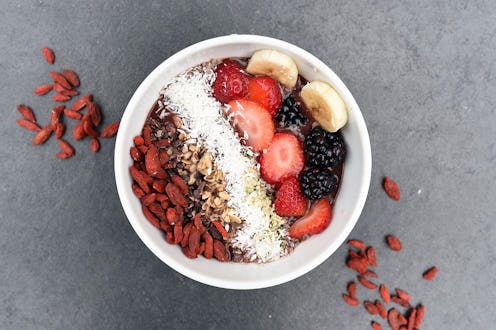
Since I decided to stop eating animals last October, I’ve had more than one well-meaning individual ask me how I’m getting all the protein I need without eating meat. (I’ve also heard a lot of comments about how “fish isn’t really meat,” and I’m still trying to figure out how to respond to that crap without sounding condescending.) Since I’m vegetarian rather than vegan, my answer usually goes something like this: “Well, you know, I still eat eggs and Greek yogurt.” Here’s the thing though: even if I chose to swear off eggs and dairy for good, I would still be fine. Not only do the majority of Americans consume double the Food and Nutrition Board’s daily recommended intake of protein, you can actually get all the protein you need from plants alone.
It is possible to buy organic veggies on a budget, and plant-based sources of protein are way better for you than any kind of meat. (Yes, even chicken.) If you still don’t believe that plants are where it’s at, that’s OK. You don’t have to take my word for it. Luckily for all of us, plant-based dietitians exist. Even luckier, one of the best in the business was kind of enough to speak to Bustle.
Julieanna Hever, a Plant-Based Dietitian, VegNews nutrition columnist, and author of The Complete Idiot’s Guide To Plant-Based Nutrition and The Vegetarian Diet agreed to tell me all about her favorite sources of plant-based protein. Here are Hever's top recommendations for getting your protein from plants.
Legumes
In addition to being super fun to say, legumes are protein rich AF. You can actually get the same amount of protein from one cup of beans and two and-a-half tablespoons of lentils that you would get from three ounces of chicken. Additionally, legumes contain a ton of other nutrients that our bodies need.
As Hever explains, "beans, lentils, peas, and soy foods are chock-full of essential amino acids and also supply the body with crucial fibers, prebiotics, and phytonutrients, supporting immune, gastrointestinal, and cardiovascular health."
What makes legumes even more awesome is the fact that they're so easy to cook with. In fact, Hever says legumes are one of her favorite plant-based sources of protein for this reason. "Not only are legumes nutrient-dense, they are also culinarily versatile and can be enjoyed in soups, stews, and chilis; tossed over salads; and mashed into hummus, dips, and spreads."
If you (like myself) are new to this whole plant-based protein thing, here are some easy vegan crock-pot recipes to get you started.
Nuts & Seeds
Personally, I've never been the biggest fan of nuts or seeds. (Though I have been known to eat organic peanut butter by the spoonful.) Now that I'm a vegetarian, I just might have to get over that though — because nuts and their butters are really good for you. As Hever points out, "nuts and seeds are nutritional nuggets filled with not only a hefty dose of protein, but also essential fats, fibers, minerals, vitamins (especially E), and powerful plant sterols."
You don't have to eat a whole bag of almonds or multiple peanut butter sandwiches to reap the numerous health benefits of these meat-free protein sources, either. "Research has shown time and time again that consuming nuts and seeds (approximately 1 to 2 ounces or 30-60 grams per day) is associated with a reduced risk of cardiovascular disease, obesity, type two diabetes, gallstone disease, and macular degeneration," Heaver says. If you're as new to cooking with nuts and seeds as I am, maybe start small with these simple no-bake recipes.
Whole Grains
You've probably heard that oatmeal is a great source of protein, but even spaghetti and rice can be solid sources of protein if you buy the right kinds. As Hever tells Bustle, "brown rice, quinoa, amaranth, oats, and whole grain pastas are some examples of the myriad grains that can substantiate a wholesome and delicious meal while offering protein, fiber, fatty acids, and B vitamins."
So if your New Year's resolution was to consume fewer carbs, you might want to reconsider. As it turns out, swearing off all carbs isn't ideal if you're hoping to get your protein from plants. As Hever explains, "Despite their reputation for being high in carbohydrates, whole grains are also wonderful staples proffering plant protein."
Leafy Greens
They may not be the most fun to consume to some people, but Hever tells Bustle that leafy greens (like spinach and kale) are "the most nutritionally dense foods on the planet with the fewest calories and optimal nutritional panel."
Even more surprising? Hever says that leafy greens are actually better sources of protein than animal products. According to Hever, "with frozen broccoli and cooked spinach supplying upwards of 45 to 51 percent of calories from protein, respectively, these are superior sources when compared to animal products."
So there you have it. The next time someone attempts to concern-troll you for being a vegetarian or vegan, you can respectfully inform them that your kale smoothie is actually a much healthier (and efficient) source of protein than their cheeseburger.